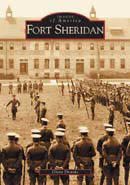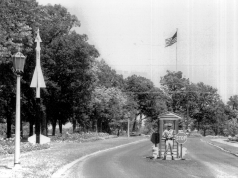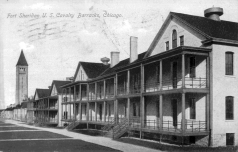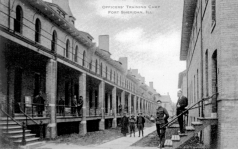Review: Occupations, Cultures, and Leadership in the Army and Air Force
George R. Mastroianni
Parameters, Winter 2005-06, pp. 76-90
The Fall Winter issue of Parameters, the journal of the US Army War Collage has a very interesting article by Dr. George R. Mastroianni on the cultural differences between the military services. He is well qualified for this as he is a Professor in the Department of Behavioral Sciences and Leadership at the Air Force War Collage and a Lieutenant Colonel in the US Army Reserve.
I spent several years as a civilian employee of a jointly manned headquarters, the differences between the services cultures are real, usually the cause of much humor, but also a potential problem in our ability to conduct war and preserve the peace.
The article's focus is on the differences between the Army and the Air Force officer corps, which is where he has his personal experience. He also limits his study to combat arms officers for the Army and pilots for the Air Force as these groups set the standard for their respective services.
He starts out with the observation that large organizations can be characterized by their members intuitional and/or occupational commitment. Are the members of the organization committed to the organization and its ideals or to a occupation that they can take to another organization depending on their self interest. He makes the assertion that, while officers in both services have share these commitments, Army officers have a stronger intuitional commitment that the Air Force officers. Partly this is because pilots have a portable skill, they can leave the service and be airline pilots, infantry officers can leave the service and be anything but infantry officers.
The differences that different occupations have on the cultures is also a factor, the way you process information as pilot flying at supersonic speeds is different than the way you would process information in a fox hole. By the time these officers reach mid and high level positions these patterns of thinking come with them and effect their actions and decisions.
A major difference between the two services is the their approach to leadership and the relationship between commissioned officers and non-commissioned officers. The humor is that the air force would say their enlisted men strap a weapons system on the back of their officers and send them into combat, whereas in the Army the officers send their enlisted men into combat. The Army would say that an Air Force pilot is really the commander of a flying tank and is a grossly overpaid staff sergeant. Both these observations are extreme overstatements. But the differences are real. An army officers first job is as a platoon leader; his platoon has a platoon sergeant, who has the job of teaching the lieutenant how to be a combat officer. While the Air Force prizes its enlisted mechanics who keep the planes flying a mechanic is not going to teach the new Air Force officer how to be a pilot. I gather that in many Air Force organizations the pilots and mechanics are in different sub-organizations. The Air Force officer respects the NCO's specialists with whom they have few interactions, the Army officer dealt with the senior NCO as a collaborator in the day to day work of his unit. The result is that an Air force Officer will spend his first formative years with a group of people who have similar backgrounds, education, training and aspirations. The Army officer spends his first formative years with other combat officers but also with people who have different backgrounds, education, training, and aspirations. At later points in their service this effects their professional relations with persons outside their service, outside the military and government. He suggests that Air Force officers can are more effective in dealing with scientific/technical people. Army officers generally have experience and training that allows them to work better with a broader set of situations and people.
When I was working in joint headquarters I saw this in play, the officers of both services were usually Captains or higher. This was typically the first assignment where an Air Force officer was in a leadership position. The Army Officer had been the platoon leader and maybe the company commander of units ranging from 20 to 150 soldiers. The Air Force officer had been held positions where his technological knowledge was essential to the organization, the army officer was a generalist who called on technical experts. This would cause problems as higher ranked Army officers had assumed that a Air Force Captain should already be an experienced leader and higher ranked Air Force officers assumed a Army Captain should have much deeper technical skills.
An observation.
The President’s military experience was as an interceptor pilot. The Secretary of Defense was a Navy reserve anti-submarine pilot. They appointed a strategic Air Force pilot as Chairman of the Joint Chiefs of Staff. Other appointments tended to follow a similar pattern. The Secretary of Defense is supporting technology based transformations. The inability of the Army professional leadership and the Secretary of Defense to understand each other are legendary. We are in ground war. The Air Force flies a sortie, destroys the target and returns to base. The Army captures a place and holds it against all comers. The Rumsfeld/Shineski controversy can be described as one seeing a sortie to replace Saddam and go home - the other seeing a mission capture a place (Iraq,) control it, and hold it. While not explaining everything or even most things, the story of events leading up to the war and it’s conduct becomes much clearer when these differences are understood.
There is much more in this article than I reviewed, I strongly recommend this article.
2 years ago








